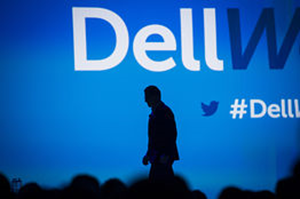|

Fund of Information
T. Rowe Price’s $194
Million Proxy Blunder
After mistakenly voting to
approve Dell’s buyout and costing four of its mutual funds a lucrative
claim, the company announced it would repay the funds’ shareholders.
By
Beverly
Goodman
June 11, 2016
By now the massive mistake of
T. Rowe Price Group’s proxy
vote on the Dell buyout—it voted yes when it meant to vote no—has been
essentially dispensed with. That’s in large part a credit to the
firm’s swift and appropriate response, though it helps that few among
us are interested in the finer points of proxy voting. And that’s
unfortunate—in part because it obscures how impressive T. Rowe’s
response is, but also because it allows investors to ignore how
unfriendly the Delaware courts can be.
|

Michael Dell takes the stage during the 2015 Dell World
Conference in Austin. Bloomberg News |
|
In short: Two weeks ago, a Delaware court agreed with the “no” voters
that the price Michael Dell paid in the leveraged buyout of the
company he founded was too low by about $4 per share (see Follow Up,
“Michael Dell’s $6 Billion Holdup”).
But because of T. Rowe’s mistake, the firm (ticker: TROW) learned
weeks ago that it would be unable to make a claim for the difference
in share price. Once the court released its determination of fair
value ($17.62 per share, versus the $13.75 Dell and Silver Lake
Partners paid), T. Rowe announced it would repay four mutual funds and
a handful of other accounts that money, plus interest, for a total of
$194 million. T. Rowe has $765 billion in assets under management.
The $22 billion
T. Rowe Price Equity Income (PRFDX)
is the largest fund to benefit, while the $3.5 billion
T. Rowe Price Science & Technology
(PRSCX) has seen the biggest increase, amounting to 1.2% of its net
asset value. The NAVs were adjusted on June 6.
THOUGH MOST NEWS REPORTS
have referred to this as a computer error, T. Rowe CEO Bill Stromberg
was quick to acknowledge to Barron’s that it was also due to
human error. It was arguably in large part due to the arcane process
of proxy voting. The Dell vote was actually five votes—the company
kept delaying the meeting that would finalize the tally. T. Rowe voted
no the first time, and typically the votes roll over when a meeting is
delayed, which means T. Rowe voted no in the first four votes. But
eight days before the final meeting, Stromberg says, Dell changed the
meeting classification from a “proxy contest” to a “special meeting.”
That wiped the old votes from the system, and since the default
position is to vote with management, that’s what it did on that last
vote.
The legal process for dealing with such a mistake, according to Mercer
Bullard, a securities law professor at the University of Mississippi,
is that a fund’s board of directors would encourage the fund to sue
its management company and negotiate a settlement. Instead, Stromberg
says he reached out to the funds’ board (one board oversees all of T.
Rowe’s funds) and told them the firm’s plan to make the funds whole.
That’s unusual. “In the world of litigating, you never get 100%
damages,” Bullard says. “No matter how you cut it, T. Rowe’s decision
is very shareholder-friendly.”
The one-time charge of $194 million in the second quarter of 2016 will
reduce T. Rowe’s net income by $118 million, or 46 cents in diluted
earnings per share. (Diluted EPS takes any convertible shares into
account.) That’s no small hit for the company, and the stock is down
2%, to $74.37, since the June 6 announcement. But think of it as a
booster shot to maintain the firm’s stellar reputation, or a vaccine
against future legal ugliness. “We’ve taken some corrective steps
right away,” Stromberg says, “and obviously we’re looking at the
process to make sure there are not other issues lurking.”
The real problem, though, is lurking in the Delaware court system,
says Bullard, which “allows companies to keep putting off the final
vote until they know they’ll get the outcome they want.”
|

